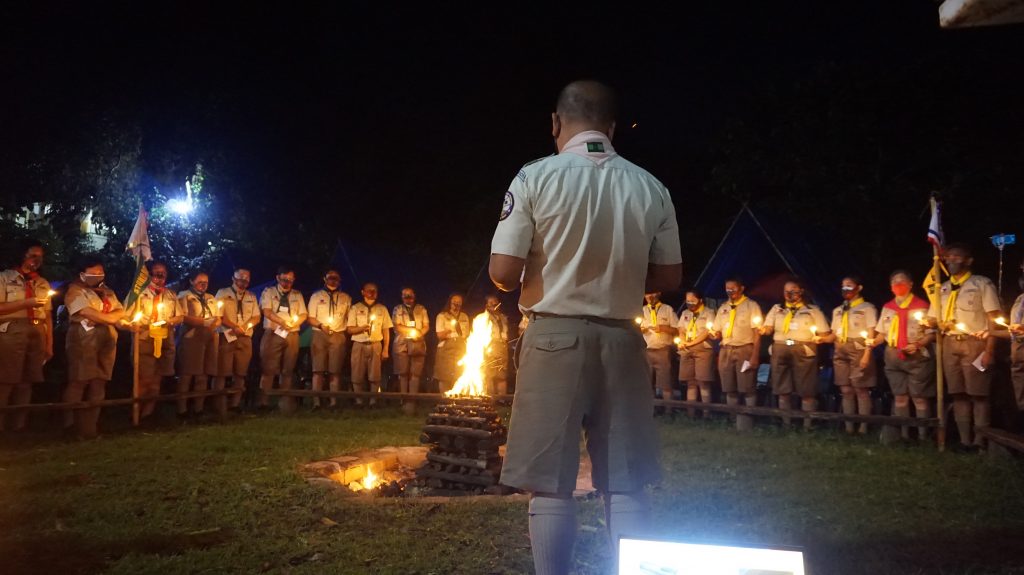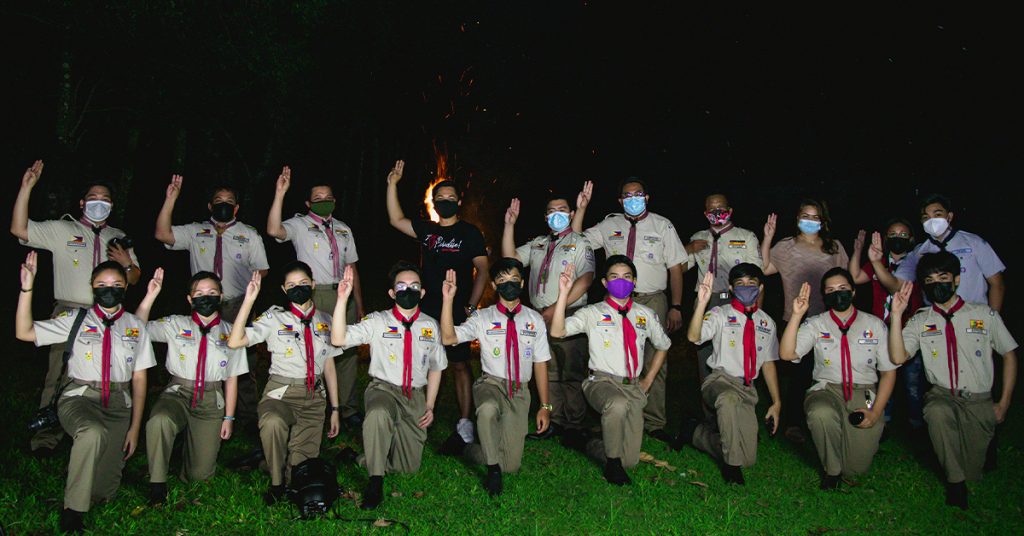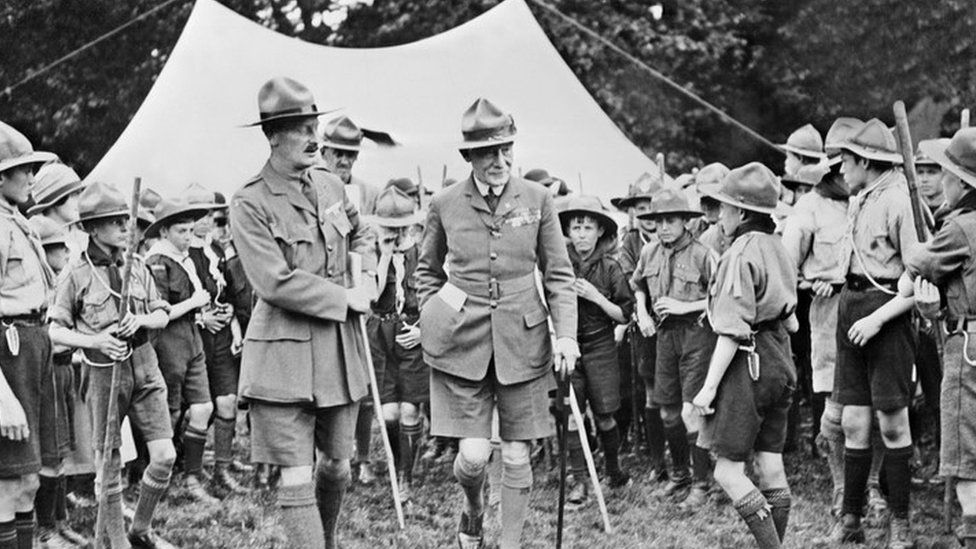There is no Scouting orientation activity where you will not hear the words, “Scouting is 75% outing”. The statement is true most of the time literally and figuratively. And then COVID-19 came when that statement became half-true.
The Scouting activities were halted, the Boy Scouts of the Philippines issued a memorandum in March 2020 to suspend all Scouting activities due to the national health concerns brought by the Coronavirus Disease 2019. Even the annual search for the Ten Outstanding Boy Scouts of the Philippines did not happen that year. It was not until late-2020 when the National Office and the Regional Offices started to conduct online Scouting activities.
One year later, the BSP – National Capital Region announced the conduct of the first-ever blended Advanced Training Course for Leaders of Adults since the pandemic began. On March 27, 2021, the two-course strong Wood Badge Training commenced with an online opening ceremony.
The ceremony was honored by BSP Secretary General Rogelio S. Villa Jr, BSP Program and Adult Resources Division Executive Yasser Sarona, BSP National Training Commissioner Leonides T. Son, and BSP-NCR Regional Scout Director Ramil S. Borbon. After the opening ceremony, each course was then separated to conduct their own opening program introducing the staff and assigning the participants to their groups.
This is the first time that an Advanced Training Course was conducted in a blended modality in the middle of the pandemic. RSD Ramil Borbon realized the importance of conducting this training even with restrictions like community quarantines and the COVID-19.
“The pandemic may have stopped our activities but not our cause. By conducting these training sessions we are proving that Scouting will go on. We are preparing our Scout Leaders to be better and more qualified to promote the Youth Development Program of the BSP,” Borbon said in an interview.
Being a Wood Badge Holder or a Gilwellian is not a status symbol. It is a responsibility that everyone should take seriously.
“The secret of getting successful work out of your trained men lies in one nutshell – in the clearness of the instructions they receive.”
– Robert Stephenson Smyth Baden-Powell
Wood Badge in the Philippines
It is expected in any program that was developed by Baden Powell to find leadership instruction as a key part of it all. And as the Scouting movement boomed to popularization as an independent activity for boys, he realized that there is a need for a formalized training program for Scoutmasters. In 1911, a lecture about the proposed program was given in London.
However, like how he envisioned the movement. BP wanted it to be practical, and that meant in woods or in a camp. In 1913, he devised the program into a syllabus, taking his book “Scouting for Boys” as the program of work. By early 1914, Baden Powell’s outline had developed into a course called “Scouting for Scoutmasters”. World War I put a halt to the development of the course, this was the reason why the first Wood Badge training was only offered at the end of WW1.
The appointed Camp Chief Francis “Skipper” Gidney led the first-ever Wood Badge Course. It happened on September 8-19, 1919 at Gilwell Park. The then Scout Commissioner William de Boise McLaren bought the Gilwell Park in 1919. It served as a venue for the course.
Gilwell Park became one of the landmarks in the Scouting Movement. Scout Leaders around the world travel there to take their Wood Badge Training.
In 1953, almost four decades after it started, Wood Badge was introduced in the Philippines. The first-ever course was held at Camp Gre-Zar in Novaliches, Quezon City. Those who have completed the training are also called Wood Badge Holder, two-bead holder, or Gilwellian.
The Boy Scouts of the Philippines currently offers four Wood Badge courses for the following sections and duration:
- ATC for Kawan Leaders , six days;
- ATC for Troop leaders, 7 days;
- ATC for Outfit Advisors, eight days; and
- ATC for Leaders of Adults, 6 days

Participants and staff in the Wood Badge yoke. Photo: QCC-BSP
Scouting provides holistic and full personal development not just for the youth but for the adults as well. Through the quality of training courses it offers, knowledge, skills, and competencies are developed and honed.
The Boy Scouts of the Philippines recognize these qualifications through Scouting Ceremonies. An Adult Leader who completed the Advanced Training Course is recognized and is awarded a Wood Badge insignia. The Wood Badge Beads is recommended as a sign of unity. The conferment of Wood Badge Tokens in accordance with the highest tradition of Wood Badge is done through a solemn and meaningful ceremony. The proper attire during an observance of conferment ceremony is the Official Scout Type A Uniform together with the complete set of Wood Badge Insignia – the Beads, Woggle, and the Scarf. The ceremony must inspire and give motivation to other leaders. To make it more memorable and meaningful, the graduates of the course sign and recite the Pledge of Service.
The historic and longest Advanced Training Course
The Advanced Training Course for Leaders of Adults is specifically designed for institutional heads, commissioners, and DepEd personnel. The discussions and its syllabus aim to teach the graduates in managing Scout Leaders in their respective jurisdictions.
On March 27, 2021, two ATC – LoA opened with about 100 participants with different backgrounds and from different parts of Metro Manila. Most of the trainees were principals, some were DepEd personnel, while others were professional Scouters. Each course has five groups named after World Scout Jamborees, they were Asagiri, Idaho, Marathon, Olympia, and Seorak.
The opening ceremony was full of energy and enthusiasm both from the participants and the staff. It is also when the Course Leaders were introduced to the participants that will be working with them. They will oversee the training to ensure that it is up to the standard set by the Boy Scouts of the Philippines and the World Organization of the Scout Movement. They were William P. Chavez (†) and Wilfredo A. Pabuaya.
“The Wood Badge will make quite certain that when I am gone, the future leaders of Scouting will really understand what it is all about and what my intentions have been”
Lord Baden-Powell

The beginning
In a memorandum released by the BSP – NCR, the schedule of the ATC – LoA was March 27-28 and April 3-4 for virtual class modality while the face-to-face setup was supposed to happen on April 8-11, 2021. All were going according to plan until the National Capital Region and the neighboring provinces were placed to Enhanced Community Quarantine on March 27, 2021 – the strictest quarantine measure in the Philippines.
With this ECQ implementation, the original face-to-face training schedule was suspended and another online set of online sessions were added.
The challenges
The participants were ready to face the yoke back then but the COVID-19 pandemic keeps on not making this happen. During the first three months, the course staff was still hopeful that the most-awaited face-to-face training will happen anytime soon. However, some of the participants have already lost hope.
The extended online sessions became hectic for the participants as schools and other businesses started to go back to 50% of their normal operation. There are participants who are now attending the sessions while attending another ongoing meeting or training on a different device. It really is a challenge but with the guidance of the Course Leaders, staff, and counselors, all participants understood the importance of attending the online sessions in preparation for the face-to-face training.
On April 30, 2021, one of the biggest challenges for the course happened. ATC – LoA 21-181 Course Leader William P. Chavez died. It is with a heavy heart that the host disclosed the information to the participants. This may not be the first time that someone died in Scouting, but all of the participants and staff were looking forward to seeing each other, alive and kicking but they knew this won’t happen anymore.
As time passed by, there were people involved in the training who got sick and fell. While the NCR was put on lower quarantine restrictions, the nearby provinces especially Rizal where the physical training was supposed to take place remain classified as high-risk areas. It was not until October that the course staff decided to continue the last part of the training online. It is when the participants also learned that there is no chance of them graduating as a complete batch anymore—one went to the final camping ground.

Scout Leader Dean Hermoso (†), was donned the Wood Badge Token posthumous.
Some of the participants were already not available to attend the online sessions due to more workloads in their respective jobs. All were shocked when the conduct of the courses was separated. Each ATC training is now conducting separate plenary sessions and none of them were expecting it. Osarlo Cantos, LT was also introduced as the new Course Leader replacing the late William P. Chavez for ATC – LoA 21-181.
Now, each group must function and perform without the help of their counterparts from the other course. On October 24, 2021, the batch graduated and is now called Wood Badge Graduates. They are not considered as Gilwellians yet as they have to wait for the donning of their Wood Badge tokens.
The victory
Not a long time after the batch graduated, the NCR and Rizal were placed to Alert Level 2 quarantine classification. Both the staff and the participants rejoiced as they can now meet each other, of course without disregarding the minimum health protocols imposed.
It was then announced in November that the face-to-face donning of Wood Badge regalias will happen on November 26-28, 2021 in an adventure park in Rizal. But again, we can not achieve victories without any challenges. Many of the graduates were not able to attend the physical event due to health concerns, busy schedules, and the list goes on. Nevertheless, the training went through.

Pabuaya leading the flag-down ceremony. Photo: QCC-BSP
One of the Course Leaders, Wilfredo A. Pabuaya, LT was happy that the face-to-face setup happened. It is not a secret that the whole course went through a lot before this finally happened.
“I’m glad that the face-to-face Wood Badge Training was conducted. That is our main objective. Without this, the Wood Badge training cannot be considered complete,” Pabuaya said in an interview.
The changes, the difference, and the common denominator
Conducting physical training in the middle of a pandemic is not easy. There are a lot of preparations made and additional rules implemented.
“Before, a host of the Wood Badge training only needed to get certification from the National Training Commission of the BSP and ensure compliance. With the health crisis we are facing, we also had to get clearances from different entities,” Borbon said.
He also added that they made sure that 100% of the participants and staff were already fully-vaccinated against COVID-19 to ensure the safety of everyone and the successful conduct of the training. He also commended the course staff for all the measures they put in place to comply with Inter-Agency Task Force for Emerging and Infectious Diseases (IATF-EID) protocols.
“Maintaining social distancing during activities, wearing face masks as part of the uniform, and frequent hand washing are just some of the adjustments made during the training,” Pabuaya added as he emphasized the changes in the program.
Regional Program Commissioner Pabuaya also mentioned that they have to make the program flexible to cater to the needs of the program while maintaining the standards set by the NTC.
Despite these adjustments, the goal of conducting this training remains the same. It is to build camaraderie between participants, give a deeper understanding of why Scouting started, and teach the core values of being a true Scoutmaster—serving with humility, unity, and equality.
The testimonies
The participants – now Wood Badge Holders – realized a lot after the training. One thing is common, their transformation to becoming a Scoutmaster molded by this training.

Cantos sharing his realization during the testimonial campfire. Photo: QCC-BSP
The widow of the late Scout Leader Emmanuel Castor—brother of Scout Roberto Castor, one of the 24 Scouts who perished in a plane crash on their way to Marathon World Scout Jamboree—is one of the participants. Agnes Castor admitted that when her husband was still alive, she was not supportive, instead, she was against Emmanuel’s participation in Scouting Activities. However, the training changed her views.
She said that it was only when she graduated that she realized the passion her late husband had for Scouting and that her experience totally changed her indignant concept against the movement.
“I did not expect the personality transformation in me would happen. I was a mean and unfriendly woman. Passing through the yoke and switching from the training scarf to the Gilwell scarf are two of the shocking experiences I had. These two things completely changed my concept,” she said.
“I also silently promised to myself that I will always abide by the wishes and dreams of my late husband—to do my best to come what may, in the path he took while he was still alive,” she added during the interview.
She is currently serving as a board member of the BSP-Quezon City Council and the owner of Ar Kids Processed Meat Products.
Aside from her, we also interviewed the Institutional Scout Coordinator of Kapitan Moy Elementary School in Quezon City. Adult Leader Mary Grace Pagatpat.
Pagatpat said that the Scouting Movement always brings her the “magical feels” whenever and wherever she participates or conducts training and activities. And that feeling was surpassed by this longest and historic Wood Badge Course.
“No obstacles, not even the pandemic, can hinder us from pursuing our great dream of becoming a full-fledged Wood Badge Holders,” she asserted.
“It is not based on the fame or status symbol of wearing the Gilwell Scarf and the two beads. But more on the service that we can give to make a difference to the lives of our youth and contribute to the betterment of our beloved nation,” she expressed.
Pagatpat also said that the Advanced Training Course made her realize more truly that Scouting is already part of her life.
The newly-donned Gilwellians are not the only ones affected by this historic course. Scout Leader Rodolfo Floresta who also served as an Assistant CL for Program was impacted deeply.
“I believe the longer time we had been in this historic Wood Badge Course for LoA somewhat tenderized our soul & spirit, that when the right moment came, we were all prepared by the Great Scoutmaster of all Scouts to take on the challenge of Scouting,” Floresta said.

Staff and participants of ATC-LoA 21-181 and ATC-LoA 21-182.
Accurately, the Wood Badge Course is one of the most important trainings in the life of Adults in Scouting. Not only it molds them to be better leader in the Scouting movement, but they are being transformed to be a better person.
“It said in the course multiple times that being the Wood Badge regalias are not a status symbol. It is a symbol of responsibility to become humble, united, and equal. You must wear it with pride, but you must not wear pride alone,” Cantos emphasized.
He also said that the participants must not treat the Wood Badge as the end of their journey but as the start of their journey to true Scouting. He also encouraged more Adult Leaders to take this course to deepen their understanding of the movement.
The Advanced Training Courses for Leaders of Adults was hosted by the BSP – Quezon City Council along with two other Courses for Managers of Learning (formerly known as Course for Assistant Leader Trainers).







